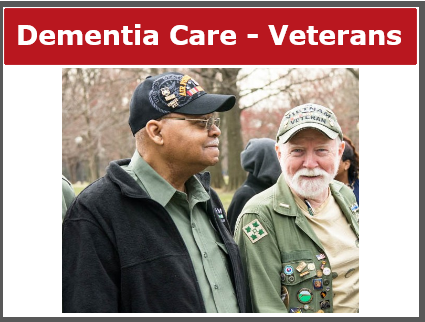Trusted Dementia Home Care in Oklahoma
Posted on: January 31 2023

Dementia, especially in the late stages, is a major cause of disability. Veterans who are diagnosed with dementia will eventually require assistance with personal care activities. Dementia care provides veterans, spouses, and family members with invaluable support as they pass through the stages of dementia.
As a progressive brain condition, dementia causes a decline in memory, thinking, behavior, and the ability to perform the activities of daily living. Alzheimer’s disease is considered to be the most common form of dementia. Alzheimer’s disease contributes to about 60 to 70 percent of dementia cases.
Dementia care can become increasingly necessary after the diagnosis is made. An early diagnosis allows for optimal management of the condition. Dementia care promotes physical and cognitive well-being; behavioral and psychological problems are detected and treated; and caregivers receive long-term support.
The Department of Veterans’ Affairs (VA) supports veterans who are diagnosed with dementia. The VA offers a range of care options, many of which veterans and their families are unaware. Veterans must meet specified criteria in order to be eligible to receive benefits.
1.VA Health Care
VA Health Care supports veterans from the initial dementia diagnosis through its terminal stage. While medications will not cure dementia or Alzheimer’s disease, the veteran’s physician may prescribe medicines to alleviate symptoms of the condition. VA Health Care covers the cost of these drugs.
Veterans who live at home will require supervision, especially as dementia symptoms progress. For instance, a dementia patient may wander, suffer hallucinations, become uncharacteristically aggressive, shuffle and fall, have issues with balance or forget to take medications—all of which reduce well-being. VA Health Care professionals provide essential care.
VA Health Care may be provided by a range of professionals, such as home health aides, skilled home health care providers, respite caregivers and homemakers. Family caregivers who also work may turn to VA Health Care for assistance at home.
2.Veteran Directed Care Program
Veterans are allotted a budget through the Veteran Directed Care Program (VDC) and may utilize funds to pay for care services. Veterans may elect to pay for adult day care, respite care or home care as they deem fit.
The VDC helps veterans with dementia to continue living in the community. Veterans may use VDC funds to purchase a wheelchair or wander prevention systems. Home modifications, such as installing grab bars or wheelchair ramps, may be made using VDC funds. All veterans enrolled in VA Health Care qualify.
3.HISA Grants
Financial assistance to make home modifications is provided through the VAs Home Improvements and Structural Alterations (HISA) Grants. Disabled veterans who demonstrate medical need (such as those with mobility issues) qualify, which makes veterans with mid- to late-stage dementia eligible to receive the grant.
4.State Veterans Homes
Veterans may elect to enter a State Veterans Home for care. These facilities provide care, such as nursing home care, assisted living (ideal for independent veterans in the early stage of dementia) and memory care (suitable for veterans with mid- or late-stage dementia).
All states in the US have at least one State Veterans Home. Some State Veterans Homes also admit the spouses of veterans. A veteran who requires long-term care in a State Veterans Home must demonstrate a clinical need for the service. Adult day care is also available in some facilities.
5.Aid & Attendance Pension
Long-term care is necessary as dementia progresses. The VAs Aid & Attendance Pension can offset the costs of long-term care for veterans and their spouses who have high care needs. Veterans and their spouses qualify once they require assistance with the activities of daily living.
Veterans and their spouses with mid- to late-stage dementia is eligible for the monthly payments through the Aid & Attendance Pension. However, veterans in the early stages of dementia may not qualify for the pension since their symptoms are not severe enough to warrant dependency.
The income provided in the pension may be used for a range of care. Veterans and spouses may utilize the funds for respite care or adult day care, for instance. Memory care units, skilled nursing care and nursing home stays may also be funded through pension payments.
Dementia care is essential for veterans and their spouses who receive a dementia diagnosis. Fortunately, the VA offers the above-mentioned forms of assistance to support veterans at all stages of the condition. Family caregivers of veterans benefit from the support, too, as caring for a dementia loved one can become overwhelming.
Veterans with dementia care needs may rely on the compassionate support from professional caregivers at Around the Clock Home Care. We are an VA Authorized Community Care Provider through the U.S. Dept. of Veterans Affairs. We offer quality, veteran home care to ensure veterans and their spouses at any stage of dementia continue to live dignified lives.
Find out more about dementia care and home care services for Veterans provided by Around the Clock Home Care.

Dementia and Memory Care Support at MEMORYCARE.COM
Sources: VA Geriatrics and Extended Care-va.gov/GERIATRICS/index.asp VA Dementia Care & Alzheimer’s-va.gov/GERIATRICS/pages/Alzheimers_and_Dementia_Care.asp
Posted in News